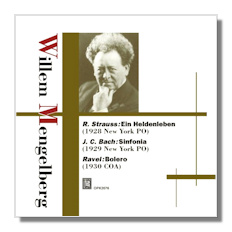
The Internet's Premier Classical Music Source
Related Links
-
J.C. Bach Reviews
Ravel Reviews
Strauss Reviews - Latest Reviews
- More Reviews
-
By Composer
-
Collections
DVD & Blu-ray
Books
Concert Reviews
Articles/Interviews
Software
Audio
Search Amazon
Recommended Links
Site News
 CD Review
CD Review
Willem Mengelberg Conducts

- Johann Christian Bach: Sinfonia in B Flat Major, Op. 18 #2
- Maurice Ravel: Boléro *
- Richard Strauss: Ein Heldenleben
* Concertgebouw Orchestra/Willem Mengelberg
New York Philharmonic Orchestra/Willem Mengelberg
Opus Kura OPK2076
This is my first Mengelberg album. I swear to you, the disc is astonishing. For years, I'd read about Mengelberg's spotty career on record, and decided that an old-fashioned conductor in poor sound was something I could do without. Still, his 1928 Ein Heldenleben was almost universally accepted to be a success, so it made it hard to resist when I saw this program on Opus Kura. I'd also read that this disc was worth it despite what I found to be ludicrous couplings. Johann Christian Bach is a rare find on disc, but in 1929, he was practically unknown. The prospect of a highly individual conductor in early sinfonias seemed to me to promise awful results. Throw in Boléro, and I expected the worst.
I couldn't have been more wrong. Despite being recorded in 1929, the New York Philharmonic turns in a stellar performance of a work that should probably be heard more often. The sound gives us a surprisingly realistic idea of what the ensemble sounded like, which is all to the good. Best of all, the conductor completely avoids mannerism, heaviness, or any other musical defect that could kill this music. In fact, he heralds modern performance with his crisp and swift attacks.
The following Boléro is significantly less revelatory. Despite typically fine solos from the ranks of the Concertgebouw, nothing about this 1930 performance is exactly eye-opening. If nothing else, it shows that the tradition of fine winds and brass from this orchestra is anything but new. The sound is okay, though it yields to the New York sessions, and has some bizarre changes whenever the dynamics shift.
The 1928 Ein Heldenleben can apparently be heard to better sonic effect elsewhere (though not on Dutton or Teldec, which choose the conductor's version from the Concertgebouw), but I'm not able to make my own comparisons. I should say up front that there is a ton of tape hiss, and it does seem to stop the music from blooming here and there. As for the performance, it really is as fine as advertised. Featuring stunning playing from the New York Philharmonic Orchestra, the music has enormous color and real personality. Mengelberg may indeed indulge in some odd shifts here and there, but he draws such a sound from his forces that it doesn't matter much. And despite the hiss, I've heard less impressive recordings from as late as three decades later. So many historical recordings feature lousy ensembles and time-beaters. This is a recording of real stature and importance. Albany Music distributes these titles, and they deserve thanks for doing so.
Copyright © 2015, Brian Wigman




















